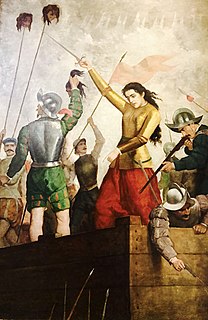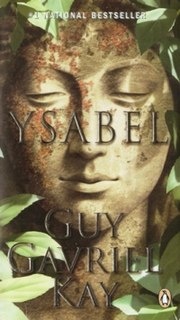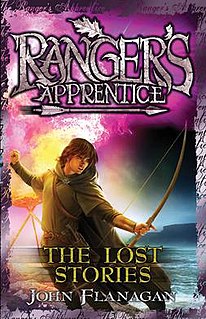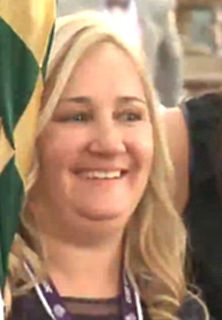
The Battle of the Little Bighorn, known to the Lakota and other Plains Indians as the Battle of the Greasy Grass and also commonly referred to as Custer's Last Stand, was an armed engagement between combined forces of the Lakota, Northern Cheyenne, and Arapaho tribes and the 7th Cavalry Regiment of the United States Army. The battle, which resulted in the defeat of U.S. forces, was the most significant action of the Great Sioux War of 1876. It took place on June 25–26, 1876, along the Little Bighorn River in the Crow Indian Reservation in southeastern Montana Territory.

Rhiannon is a major figure in the Mabinogi, the medieval Welsh story collection. She appears mainly in the First Branch of the Mabinogi, and again in the Third Branch. She is a strong-minded Otherworld woman, who chooses Pwyll, prince of Dyfed, as her consort, in preference to another man to whom she has already been betrothed. She is intelligent, politically strategic, beautiful, and famed for her wealth and generosity. With Pwyll she has a son, the hero Pryderi, who later inherits the lordship of Dyfed. She endures tragedy when her newborn child is abducted, and she is accused of infanticide. As a widow she marries Manawydan of the British royal family, and has further adventures involving enchantments.

George Armstrong Custer was a United States Army officer and cavalry commander in the American Civil War and the American Indian Wars.

The Dalton Gang was a group of outlaws in the American Old West during 1890–1892. It was also known as The Dalton Brothers because four of its members were brothers. The gang specialized in bank and train robberies. During an attempted double bank robbery in Coffeyville, Kansas in 1892, two of the brothers and two other gang members were killed; Emmett survived and was captured, tried, and convicted. He was paroled after serving 14 years in prison.
"In a Grove" is a short story by Ryūnosuke Akutagawa; it first appeared in the January 1922 edition of the Japanese literature monthly Shinchō. Akira Kurosawa used this story as the basis for the plot of his award-winning 1950 movie Rashōmon. The work was ranked by The Telegraph in 2014 as one of the 10 all-time greatest Asian novels.

Crazy Horse ; was a Lakota war leader of the Oglala band in the 19th century. He took up arms against the United States federal government to fight against encroachment by white American settlers on Native American territory and to preserve the traditional way of life of the Lakota people. His participation in several famous battles of the Black Hills War on the northern Great Plains, among them the Fetterman Fight in 1866 in which he acted as a decoy and the Battle of the Little Bighorn in 1876 in which he led a war party to victory, earned him great respect from both his enemies and his own people.

Inés Suárez, was a Spanish conquistadora who participated in the Conquest of Chile with Pedro de Valdivia, successfully defending the newly conquered Santiago against an attack in 1541 by the indigenous Mapuche.
Lozen was a warrior and prophet of the Chihenne Chiricahua Apache. She was the sister of Victorio, a prominent chief. Born into the Chihenne band during the 1840s, Lozen was, according to legends, able to use her powers in battle to learn the movements of the enemy. According to James Kaywaykla, Victorio introduced her to Nana, "Lozen is my right hand ... strong as a man, braver than most, and cunning in strategy. Lozen is a shield to her people".

Poirot's Early Cases is a short story collection written by Agatha Christie and first published in the UK by Collins Crime Club in September 1974. The book retailed at £2.25. Although the stories contained within the volume had all appeared in previous US collections, the book also appeared there later in 1974 under the slightly different title of Hercule Poirot's Early Cases in an edition retailing at $6.95.

Green Shadows, White Whale is a 1992 novel by Ray Bradbury. It gives a fictionalized account of his journey to Ireland in 1953-1954 to write a screen adaptation of the novel Moby-Dick with director John Huston. Bradbury has said he wrote it after reading actress Katharine Hepburn's account of filming The African Queen with Huston in Africa. The title itself is a play on Peter Viertel's novel White Hunter, Black Heart, which is also about Huston.

Ysabel is a fantasy novel by Canadian author Guy Gavriel Kay. It was first published in January 2007 by Viking Canada. It is Kay's first urban fantasy and his first book set outside his fantasied Europe milieux since the publication of his first three novels in the 1980s. Kay lived in the countryside near Aix-en-Provence, the setting of Ysabel, while he wrote it. The story tells of 15-year-old Ned Marriner who discovers his magical heritage while staying with his photographer father in Provence. He meets an American exchange student, the two become involved in an ancient "story" of love, sacrifice, and magic unfolding in the present day, which draws in Ned's family and friends.

American Horse was an Oglala Lakota warrior chief renowned for courage and honor. American Horse is notable in American history as one of the principal war chiefs allied with Crazy Horse during Red Cloud's War (1866–1868) and the Battle of the Little Bighorn during the Great Sioux War of 1876-1877. Chief American Horse was a son of Old Chief Smoke, an Oglala Lakota head chief and one of the last great Shirt Wearers, a highly prestigious Lakota warrior society. He was a signatory to the Fort Laramie Treaty of 1868, along with his brothers Chief Red Cloud and Chief Blue Horse. A month or so after the Treaty, American Horse was chosen a "Ogle Tanka Un" along with Crazy Horse, Young-Man-Afraid-of-His-Horses and Man That Owns a Sword. On September 9, 1876, American Horse was mortally wounded in the Battle of Slim Buttes fighting to protect his family and defending against the white invasion of the "Paha Sapa" Black Hills.
The Prince Who Worked as Satan's Servant and Saved the King from Hell is a Lithuanian fairy tale collected by German linguists August Leskien and Karl Brugmann. Andrew Lang included it in The Grey Fairy Book under the title The Magician's Horse.

Horowitz Horror and More Horowitz Horror are two collections of short horror stories written by Anthony Horowitz, published in 1999 and 2000 respectively. A third set of stories called More Bloody Horowitz was published in 2009. The first two collections were also published in a single collection called The Complete Horowitz Horror.

Fools Crow is a 1986 novel written by Native American author James Welch. Set in Montana shortly after the Civil War, this novel tells of White Man's Dog, a young Blackfeet Indian on the verge of manhood, and his band, known as the Lone Eaters. The invasion of white society threatens to change their traditional way of life, and they must choose to fight or assimilate. The story is a portrait of a culture under pressure from colonization. The story culminates with the historic Marias Massacre of 1870, in which the U.S. Cavalry killed a friendly band of Blackfeet, consisting mostly of non-combatants.

The Exquisite Cadaver AKA: The Cruel Ones is a 1969 Spanish film noir psychological thriller film directed by Vicente Aranda, based on the short story Bailando Para Parker written by Gonzalo Suárez. The plot follows a well-to-do publisher and family man who begins to receive severed body parts in the mail two years after his mistress committed suicide. Along with one of these bloody parcels is a letter of blackmail from the dead woman's former lesbian lover, who seeks vengeance.
The 1989 Grand National was the 143rd renewal of the Grand National horse race that took place at Aintree Racecourse near Liverpool, England, on 8 April 1989.

The Lost Stories is the eleventh book, and penultimate installment, in the New York Times best-selling series, Ranger's Apprentice by Australian author John Flanagan. It is a collection of "lost" tales that fill in the gaps between Ranger's Apprentice novels.

Katherine "Kathy" Ritvo is a race horse trainer who won the Breeders' Cup Classic in 2013 with Mucho Macho Man after having finished a close second in the same race in 2012. She is the first woman to have trained a winner of that race. She also was only the fifth woman trainer to win any Breeders' Cup race, and was the 14th woman trainer to saddle a starter in the Kentucky Derby in the 137 years that race had been run by 2011.













